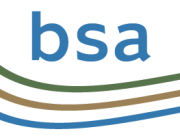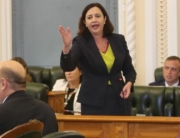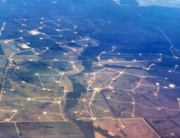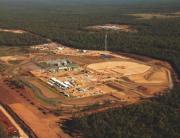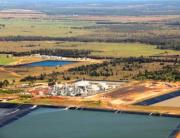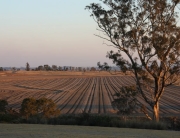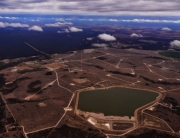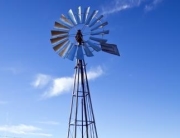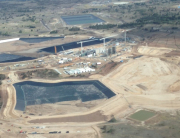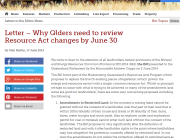This Parliamentary Committee report from George Houen relates to his appearance before the Agriculture & Environment Committee that is reviewing EPOLA submissions.
New Hope and Adani both mounted all-out attack on the underground water Bill at today’s hearing, but somehow I think they’ll be disappointed in the outcome.
Adani emphasised the time and effort taken so far on their approvals, and how this (ie. no material change to the requirement for them to get a water licence for dewatering, just as they do now) was going to make them do most of the EIS/environmental stuff again, open them up to further legal appeals etc. Adani had 2 top executives there.
New Hope’s complaint was similar – they had 2 executives and their lawyer plus 8 of the Acland staff (who’d all made submissions, we were assured). They said a further year’s delay was inevitable as a result of the EPOLA Bill, and they paraded their disputed jobs numbers claiming many would be lost as the mine’s production declines while waiting for New Acland Stage 3.
There was a detailed attack on the Bill in the Australian today – demonstrating among other things that they apparently breached the rules by publishing the submissions before they were accepted by the Committee.
Their problem was –
- Jo Bragg of EDO rattled off the many strikes against both companies in the Land Court, including the quality of New Hope’s evidence and the various jobs and revenue figures which were discredited, etc. etc.
- I pointed out that in the public briefing a couple of weeks or so ago the Department had given an assurance that in applying for the water (dewatering) licence they would be credited with everything relevant that was already done in environmental assessments and that work would not be duplicated
- Everybody jumped on them for apparently assuming that the LNP’s WROLA Act (which gives miners open slather dewatering) was going to prevail
- The department confirmed, in answer to a Committee member, that Adani and New Hope, as applicants for mining leases, could have made their water licence applications long ago
- I pointed out that these transitional arrangements where existing approvals and unfinished applications continue under the old regime are in keeping with standard transitional policy
- I pointed out that the resource companies and to a lesser extent the Resources Council and APPEA had spent their time complaining about those transitional arrangements and not a word, good or bad, about the scheme for new dewatering approvals including for CSG projects to be assessed as part of the environmental authority
Somehow I don’t think the resource companies quite got their desired result.
Otherwise, all other contributors and I supported the Bill, with our own individual provisos.
Andrew Barger for the Resources Council and Matthew Paul for APPEA both urged, in a constructive way, that there should be proper open consultation before the underground water regime is changed, but I think the Committee will adopt the department’s line which is that in this case the drawn-out events since 2014 with the LNP’s amendments then 2 Bills from Labour amount to a lot of consideration.
George Houen

